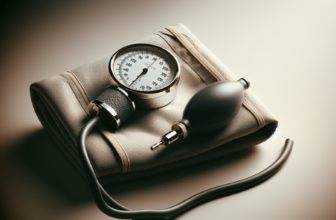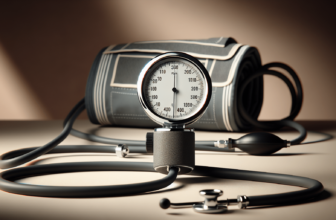
Have you ever wondered how stress impacts your body, especially your blood pressure? Understanding the connection between stress and blood pressure is crucial for maintaining your overall health. Let’s take a closer look at this relationship, breaking it down in a way that’s easy to digest.

What Is Blood Pressure?
Blood pressure is the force exerted by circulating blood against the walls of your blood vessels. It is measured in millimeters of mercury (mmHg) and is given as two numbers: systolic pressure (the first number) and diastolic pressure (the second number).
- Systolic pressure measures the pressure in your arteries when your heart beats.
- Diastolic pressure measures the pressure in your arteries when your heart rests between beats.
Normal blood pressure is typically considered to be around 120/80 mmHg. However, these numbers can vary based on a range of factors, including age, weight, and lifestyle choices.
Why is Blood Pressure Important?
Maintaining a healthy blood pressure is vital because high blood pressure (hypertension) can lead to serious health issues. These include heart disease, stroke, kidney damage, and other complications. Keeping your blood pressure in a healthy range is essential for your overall well-being.
Understanding Stress
Stress is a natural response your body has to challenges or demands. It’s a complex reaction involving both physical and emotional components. When you’re faced with a threat or challenge, your body releases hormones like adrenaline and cortisol, which prepare you for a “fight or flight” response. While this is a normal part of life, chronic stress can have negative effects.
Types of Stress
- Acute Stress: This is short-term stress that arises from recent events or situations. It’s typically manageable and can even motivate you.
- Chronic Stress: This refers to long-term stress that can result from ongoing issues, such as work pressures, financial difficulties, or relationship problems. Chronic stress can have serious health effects, including altering your blood pressure.
How Stress Influences Blood Pressure
You might be wondering, how does stress actually affect your blood pressure? Let’s break it down:
Temporary Increases in Blood Pressure
When you experience acute stress, such as a job interview or a family emergency, your body reacts quickly. The hormones released during this time increase your heart rate and narrow your blood vessels, which leads to a temporary spike in blood pressure. This is your body’s way of preparing to handle the immediate challenge.
Long-term Stress Effects
Chronic stress can lead to prolonged periods of high blood pressure. When your body remains in a constant state of high alert, your cardiovascular system works overtime. Over time, this can damage your blood vessels and contribute to hypertension.
The following table summarizes the effects of acute vs. chronic stress on blood pressure:
| Type of Stress | Effect on Blood Pressure |
|---|---|
| Acute Stress | Temporary spike in blood pressure |
| Chronic Stress | Prolonged high blood pressure levels |
The Role of Hormones
Hormones play a significant role in how stress affects your body and blood pressure. Key hormones involved include:
- Adrenaline: This hormone increases your heart rate and blood flow to muscles, which raises blood pressure.
- Cortisol: Known as the stress hormone, cortisol helps regulate various body functions, but prolonged high levels can lead to high blood pressure and other health issues.
The Stress Response and Heart Rate
When you’re stressed, your heart rate increases. A consistent rise in heart rate can contribute to hypertension over time. This can be particularly concerning if you lead a lifestyle that combines stress with other risk factors, such as a poor diet or lack of exercise.
Other Factors Contributing to Blood Pressure Changes
While stress is a significant factor, several other aspects can influence your blood pressure. Paying attention to these can empower you to maintain a healthy blood pressure.
Diet
Your diet plays a crucial role in your blood pressure levels. High sodium intake is well-known to elevate blood pressure, while a diet rich in fruits, vegetables, whole grains, and lean proteins can help keep it in check.
Physical Activity
Regular exercise is essential for managing blood pressure. Physical activity strengthens your heart, enabling it to pump blood more efficiently and reducing the pressure in your arteries.
Sleep
Poor sleep quality can elevate your blood pressure. Lack of sleep can lead to elevated stress levels, creating a cycle that is hard to break. Prioritizing restorative sleep is vital for your health.
Alcohol and Tobacco Use
Consumption of alcohol and tobacco can also negatively impact your blood pressure. Both can contribute to hypertension and should be moderated or avoided for optimal heart health.
Managing Stress for Better Blood Pressure
You might be thinking, “How can I manage my stress to keep my blood pressure in check?” Here are some effective strategies to consider:
Mindfulness and Relaxation Techniques
Practices such as meditation, deep breathing, and yoga can help you manage stress effectively. These techniques encourage mindfulness, which can lower your heart rate and reduce blood pressure.
Regular Exercise
Incorporating physical activity into your routine can be a game-changer. Aim for at least 150 minutes of moderate aerobic activity each week. Exercise releases endorphins, the feel-good hormones, which combat stress.
Healthy Diet Choices
Focus on a balanced diet high in fruits, vegetables, whole grains, and lean proteins. Maintaining a diet low in saturated fats and high in potassium can be particularly beneficial for your blood pressure.
Seeking Support
Don’t underestimate the power of talking about your stressors. Whether it’s to friends, family, or a mental health professional, sharing your burdens can significantly lighten your load.
| Stress Management Technique | Description |
|---|---|
| Mindfulness | Techniques for being present and aware |
| Regular Exercise | Physical activity to boost mood |
| Healthy Diet | Nutritious food choices to support health |
| Seeking Support | Talking about your stressors with others |
When to Seek Help
If you find yourself consistently struggling with stress or noticing changes in your blood pressure, it may be time to seek professional help. A healthcare provider can assess your situation, provide guidance, and suggest appropriate interventions.
Conclusion
The relationship between stress and blood pressure is complex but vital to understand. While stress can lead to temporary spikes in blood pressure, chronic stress poses a long-term risk for developing hypertension.
Incorporating stress management techniques into your daily routine can positively affect your overall health. This will not only help you maintain a healthy blood pressure but also improve your quality of life. Remember, it’s essential to take care of yourself by recognizing stress and addressing it effectively. Prioritizing your mental and physical wellness is key to a happier and healthier you.







